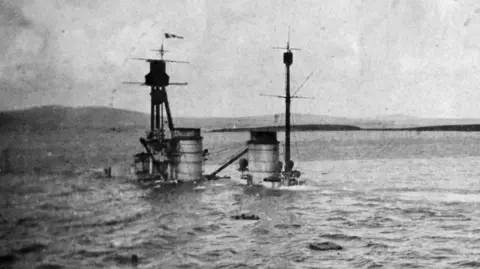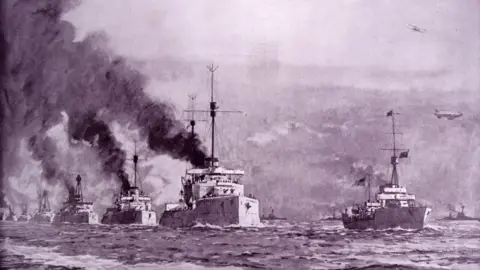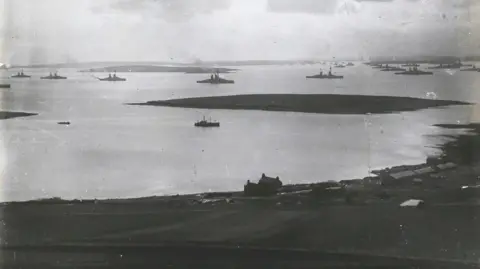BBC Scotland’s environment correspondent
 Photo 12/Getty Images
Photo 12/Getty ImagesLegal protection has been announced to preserve what remains of World War One warships in Scapa Bay off Orkney.
The 52-strong German High Seas fleet was scuttled – deliberately sunk – by its crews in 1919 when the commander, Admiral Ludwig von Reuter, mistakenly thought peace talks had failed.
Some of the vessels have been salvaged over the years along with many artefacts including ships’ bells, navigational equipment and even musical instruments.
The historic Marine Protected Area (MPA) designation, announced by the Scottish government, will now make it a criminal offence to remove items from the sites.
Orkney Islands Council, which has been pushing for historic MPA status for many years, assessed that the wrecks were vulnerable and there was a risk of losing “features of historical importance.”
 Universal History Archive/Getty Images
Universal History Archive/Getty ImagesThe British warships sunk in Scapa Flow – HMS Royal Oak and HMS Vanguard – are classified as war graves and special permission is needed from the Ministry of Defence to visit them.
But the German fleet, and other wrecks in the waters around Orkney, have become popular diving sites.
For decades items were allowed to be removed as long as their recovery was registered.
It meant hundreds of items had been added to private collections or become museum pieces.
Queen of Sweden
In 2001, Historic Scotland designated seven wrecks from the German fleet as nationally important scheduled monuments meaning divers could only visit them on a “look but don’t touch” basis.
The historic MPA status widens that protection to other ships and creates additional legal powers against anyone removing items from within the zone.
Energy Secretary Gillian Martin said the designation would protect some of the most significant wreck sites in our seas.
She said: “The designation of these sites recognises their national value and will help to ensure that future generations can continue to explore, learn from, and be inspired by Scotland’s underwater heritage.”
 Hulton Archive/Getty Images
Hulton Archive/Getty ImagesHistoric MPA status is also being granted to the Queen of Sweden wreck off Shetland which sank in a storm in 1745.
It is recognised as one of the best preserved remains of a ship from the Swedish East Indian Company and was the largest vessel in the company’s fleet when it was lost.
Both MPAs will come into effect in November.
Orkney Islands Council leader Heather Woodbridge welcomed the announcement.
She said: “Wrecked vessels, including those of the German High Seas Fleet, are a significant heritage asset and attract visitors from all over the world, contributing to the economy of Orkney.”
www.bbc.com
#Special #legal #protection #announced #Orkney #shipwreck #sites






